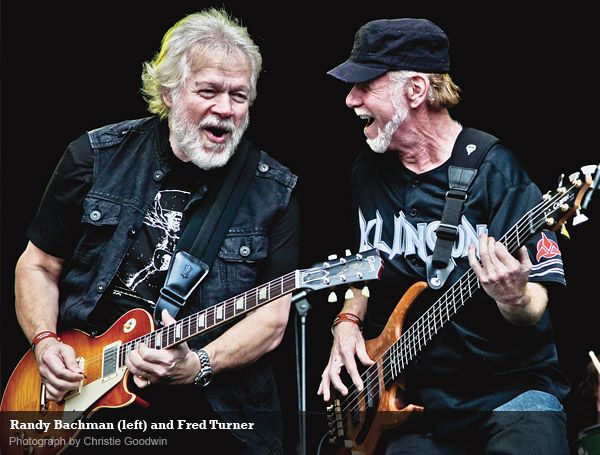
Canadian rock group Bachman-Turner Overdrive sold over seven million albums worldwide in the 1970s alone, including some of the most-played singles of all time, like “Let it Ride,” “You Ain’t Seen Nothing Yet,” “Takin’ Care of Business,” “Hey You” and “Roll on Down the Highway.”
Randy Bachman, who had founded both the Guess Who and Brave Belt with Chad Allan, told Elmore: “Chad Allan wanted to stay home. In the middle of this contract with Reprise Records, which Neil Young had helped me get, my lead singer leaves me after having a Top 20 hit, and I’m kind of desperate. I call my brother and say, I need a singer, and he says, Freddie Turner is still there and he can still sing “House of the Rising Sun” like I haven’t heard, and I say Find him! We instantly changed, he gave us this voice, our music became heavier and we were part of this revolution called heavy rock with big choruses and big screaming vocals like Fogerty.”
The band changed their name to Bachman-Turner Overdrive and released their first album in May of 1973, and it became their first gold record. BTO went on to re-lease Bachman-Turner Overdrive II (1973), Not Fragile (1974), Four Wheel Drive (1975) and Head On (1975). After numerous splits and reunions, Bachman & Turner are back with a 2010 self-titled album and tour. BTO is recognized as one of the bands that kept guitar-heavy rock alive and popular when disco and soft-rock ruled the radio. BTO’s music has appeared in television commercials, Rock Band 2 and The Simpsons. BTO has won many awards, including Juno Awards for Most Promising Group of the Year (1974), and Group of the Year (1975, 1976); Guitar Magazine rated “Takin’ Care of Business” tenth on their Top-100 most-covered songs.
Randy Bachman
Born September 27, 1943 in Winnipeg, Manitoba, Randolph Charles “Randy” Bachman was set for stardom at the ripe age of three, winning a radio talent contest, then studying violin in the Royal Toronto Conservatory system well before he became the lead guitarist, songwriter and founding member for both the Guess Who and Bachman-Turner Overdrive.
In 1960, Bachman and Chad Allan co-founded the Canadian rock group Al and the Silvertones, but later changed the name to the Guess Who. The Canadian Music Hall of Famers released numerous hits in Bachman’s tenure, starting with a cover of Johnny Kidd’s “Shakin’ All Over” and continuing with studio albums: Wheatfield Soul (1968), Canned Wheat (1969) and American Woman (1970). In 1970, the single “American Woman” hit Number One on the US charts, a first for a Canadian band. At the peak of the Guess Who’s success, Bachman left the band over conflicts with his Mormon beliefs and his wanting to spend more time with his brothers.
Before Bachman’s departure from the Guess Who, he recorded Axe, a solo album, and the following year formed Brave Belt with Chad Allan. The band’s two albums strayed from the blues-based rock sound of the Guess Who and into a more country-rock feel. A personnel shakeup in Brave Belt resulted in the departure of Allan and the arrival of Fred Turner and Randy’s brothers Tim and Robbie, creating the new group Bachman-Turner Overdrive. BTO’s albums included some of the biggest hits from the ’70s. Soon after the release of Freeways in late 1976, Bachman left the band in pursuit of a solo career, feeling unsatisfied with his role in the band during the recording of Freeways (he only wrote one song) as well as the album’s relatively disappointing chart performance.
Bachman’s solo career was a bit of a non-starter, but rebounded by co-founding Ironhorse. Their first album became popular in Europe. He recorded a second album with Ironhorse before reuniting with Turner under the name Union for the 1980 album On Strike. Bachman has since played with reunited versions of both the Guess Who and BTO before recording a new album with Turner under the current name, Bachman & Turner, in 2010. A tour followed in 2011.
In 2001, Bachman received an honorary Doctorate of Music from Brandon University in Brandon, Manitoba and also was the recipient of the Governor General’s Performing Arts Award, Canada’s highest distinction for excellence in performing arts. In 2008, Bachman was made an Officer of the Order of Canada.
Fred Turner
Born October 16, 1943 in Winnipeg, Manitoba, Charles Frederick “Fred” Turner was the bassist, vocalist, songwriter and a founding member of Bachman-Turner Overdrive. After playing in over a dozen bands throughout his youth, Turner joined Randy Bachman’s band, Brave Belt, in 1971—Turner and Bachman had been friends and neighbors since childhood. The departure of Chad Allan [vocalist, formerly of the Guess Who] paved the way for Turner, who stepped in as a full-time lead vocalist and bassist. The band soon changed its name to Bachman-Turner Overdrive.
After Bachman’s 1977 departure from BTO, Turner switched from bass to rhythm guitar to make room for Bachman’s replacement. For legal reasons, the band was referred to only as BTO. Turner served as the lead vocalist on many of BTO’s most popular tracks, including “Roll on Down the Highway,” “Let it Ride,” “Blue Collar,” “Four Wheel Drive” and “Not Fragile.”
Turner’s last performance on stage with BTO was in 2004, backed by the Little River Band. Turner is the only member of BTO to be on every record the band released in their over 30 year history. In 2010, Turner reunited with Bachman and recorded their new self-titled album, followed by a world tour to support the record. Fred Turner has earned many awards throughout his illustrious career, notably for his songwriting during his tenure in BTO.
![]()
What are you listening to right now?
Randy Bachman: I’m intrigued by all the weird things Jack White’s doing, and the early—not the later—Black Keys, and Lucinda Williams. I’m liking more raw rock ‘n’ roll, played live with a few mistakes in it rather than absolutely perfect licks. If you sit in front of a computer for enough days you can get perfect stuff, but there’s really not any heart and soul or emotion in any of that.
I do a radio show every Saturday where I play old vinyl and I tell my old stories. You learn to appreciate what was done with one or two mikes in a room. It is a performance; it speeds up, it slows down, this is wrong, you hear these little mistakes, and they’re wonderful, charming, like you’re in the room with the guy; it’s not like you’re in the room with the guy and a computer. I like that you get an appreciation for the incredible voices of Elvis, of Aretha, of Ella Fitzgerald, who never sang pitchy, they sang perfect every single time.
Fred Turner: I still go back and listen to older things that I used to like back in the ’60s. I pulled out a whole pile of Chuck Berry stuff and listened to that lately. Europe. Supertramp.
What was the first record you ever bought?
RB: My mother had a sister that was ten years younger than her and about eight years older than me. She was 19 or 20, and she would lend me her records: Wynonie Harris and Bobby Blue Bland. I’m just learning guitar and going, This is incredible stuff!, and then I see Elvis on TV, so the first record I bought really was “Hound Dog” and “Don’t Be Cruel” and I played it to death. Those were two really great A sides. Then I discovered Gene Vincent and the Blue Caps with Cliff Gallup on guitar. I saw them in Winnipeg three days in a row. Gene Vincent came to my house for Easter dinner, it was pretty amazing. I was pretty bold as a kid. Busses of country western and rock ‘n’ roll stars would play Minneapolis, then up to Fargo, North Dakota, then Grand Forks where there was an Air Force base, so why not just go to Winnipeg, 75 or 80 miles away? I got to see the Dick Clark caravans, Ray Charles, the Champs, all the Motown guys, the whole country and western thing: Ferlin Husky, Ray Price, Patsy Cline, Jimmy Dean and everybody. I was too young to go but my aunt would take me.
FT: Ventures guitar album, that’s one of the first ones. I had some Elvis singles, the Sun things. I still cannot sit down and listen to very much Elvis past that Sun collection. That Sun collection is the thing that still grabs me.
Where do you buy your music?
RB: England. London still has record stores, vinyl, they’re on every corner. HMV has the most incredible compilations, all these incredible recordings by guys you’ve never heard of; they were local regional hits from Philadelphia or wherever—just incredible modern music and I use them all for my radio show ’cause I play all old vinyl.
FT: I get all my music from my kids. They’ll bring things over or they’ll send me something.
What was the first instrument you played?
RB: I grew up playing the violin from five to about 14. I played violin until I saw Elvis on Ed Sullivan, then I switched to guitar. Everybody—Sammy Hagar, Ted Nugent—when they saw that Elvis thing, their world changed from that moment.
When I switched to guitar I just said, I’m leaving that behind, but about 15 years ago I saw Los Lobos in Vancouver and David Hidalgo pulled out a violin and it had frets on it. The worst thing about a violin is you’re trying to find the notes, right? I said, Where did you get that done? The violin is too small for me, so I got a viola, sent it down to the music store and they put on 10 frets for me, so now I can play like mad.
FT: My sister’s accordion. I played accordion until I saw Elvis Presley on Ed Sullivan.
What brought you to the instrument you now play?
RB: I would go and see Ray Price, then suddenly I started noticing the guitar players. Roger Miller comes out and he’s got “King of the Road” and then this guy comes out with a telecaster on his knee and it’s Thumbs Carlisle backing up Roger Miller, playing all this incredible stuff, and I’m like, This is what I want to do! Going to the Winnipeg Arena and seeing the Champs and the Everly Brothers five, six, seven, eight times, and actually waiting for them back stage when they all just piled into a station wagon, getting their autographs and seeing they were just normal guys with pimples. I watched Rock Around the Clock and The Girl Can’t Help It and everything is perfect in those movies, but I just saw that they were just normal guys who happened to have a great song and so that kind of shaped my whole teenage life, and Fred, too. Growing up in Winnipeg, we saw an incredible amount of music there.
FT: When I saw Elvis Presley on Ed Sullivan, I took my sister’s accordion down to a store called Winnipeg Piano and I traded it in for a Les Paul Junior and a little Gibson amp. My father was livid.
The accordion wasn’t worth what it cost for the Les Paul Junior and the amp, so the owner of the store sent me home with a contract for my father to co-sign for me. My father looked at me and said, “You’re crazy, you’ll never pay this thing off, I’m not signing this!” So I had to take the guitar and the amp back to the music store and old man Graspy looked at me and said, “Your dad’s not gonna sign? I’ll tell you what, kid. You come in here every Saturday, if you’ve only got a quarter in your pocket, you give me that quarter, and you take these home with you.” [Laughs] I bought a lot of instruments from that store afterward!
Who would you like to write with that you haven’t?
RB: I’d like to co-write Steven Tyler’s album that he’s writing right now. Steven, call me! I’m here!
Steven’s great. We threw him out of our dressing room in early BTO. Bruce Allen [BTO’s manager] came and said, “This new band is breaking out of Boston (where we were playing). Can they open the show?” “Dream On” was brand new, we’d never met the band, we had no idea what they looked like. We’re sitting in our dressing room, pre-show, nervous, trying to get calm and cool and practicing guitar, and in walks this guy wearing like I Dream of Jeannie outfits, women’s pants, flowing silk scarves. “Hi man,” and he kicks in the door. I go, Who is this guy? He thinks he’s Elvis coming in here? Throw him out! So Bruce Allen throws him out. Then I hear “Dream On,” and he’s on stage, the lead singer!
Much later, I walked up to Steven and I said, Steven do you hold any grudges? He says, “No, y’know I was pretty much an asshole back then.” We have an ongoing joke with Steve Tyler.
FT: I have trouble writing with somebody else. Writing’s a drawn out thing for me and it becomes really personal. I have written with Randy before and we’ve hit some good things, but basically I do write by myself.
What musician influenced you most?
RB: I needed a translator, and when I was 15, I met a guy named Lenny Breau, who had been playing since he was six, playing for ten years, and he played finger style guitar like Chet Atkins which was like Scotty Moore backing Elvis. I was a sponge. I’d been playing violin for so long and you just play melody on violin and I’d say, How do I play this? and he’d say, “put on the record and go here,” and I would learn it just like that. So, in two years with this guy, which I flunked in school, I learned probably five Chet Atkins albums. Chet Atkins plays bluegrass, country, rock, jazz, Broadway standards, everything, with his fingers and harmonics and everything. After that, Elvis was easy, and after that, the Ventures and the Shadows were easy and Duane Eddy…one note, come on, y’know? I learned it all by ear, so this one guy, Lenny Breau, taught me everything. My next biggest influence was the old Eric Clapton, playing less, sustained notes, which, to me, was like playing violin. My solo in “American Woman” is like a violin solo. I had this thing that would sustain the string just like a long bow stroke.
FT: I don’t think I could put one down…Buddy Holly, the Everly Brothers, Elvis, Bill Haley, Gene Vincent and on and on and on and then into the Motown stuff: Wilson Pickett, then Eric Burdon and the English thing…influence came from everywhere.
What was the song or event that made you realize you wanted to be in music?
RB: When I was three, they had a country radio show in Winnipeg, and every noon they’d say, “We’re now going to have the King of the Saddle contest.” My mother taught me a couple of songs on a little guitar that was open tuned, and I’d go on in a little cowboy hat, and I’m so cute and I’d sing “Beautiful Brown Eyes,” and win. To get an envelope with $5 in it when you’re three…I’m looking in kid terms: This can buy you 50 chocolate bars, or this many comic books, which were a dime then right? I thought, I really like this. I go back the next week, there’s a little girl, four, who sings a song and she’s Queen of the Saddle. In that one week I learned the agony of defeat and the thrill of the victory. This is show business.
The first day of school, grade one, the teacher is doing the seating plan and she says to the first seat, “What is your name, what does your daddy do and what do you want to be when you grow up?” She gets to me and I say, My name is Randy Bachman, my dad is an optician and I’m a musician. She says, “But what do you want to be when you grow up?” She asks again, and I repeat the same thing, and the third time I burst into tears and run home. My mother’s doing laundry and I say, I’m quitting, I can’t get anything right in school. She says, “This is grade one, you got 12 more years of this.” She takes me back to Ms. Stracham—I never forgot this teacher because this was trauma for me—and she explains that I’ve been playing violin for about a year at that time and that I’m committed to music. From that point on, I was the kid in grade one that knew what I was!
FT: I knew what I wanted to do, but never thought I’d get the chance to do it. I went on stage for the first time when I was 14 years old and I’d been playing right up until I was 28 but just couldn’t make enough money playing part time, so I figured this is going to be a hobby for me. I love it but I’m never going to make enough money out of it. I had 16 or 17 jobs through these years. My last job, I worked for Olivetti-Underwood and went around fixing stuff. In 1969, Olivetti in Italy was making a big move into a new thing called computers; the boss said, “We want to send you over there to learn all about computers.” I looked at him and I thought to myself, Music, computers. Music, computers. I had this band called the D-Drifters in Winnipeg. They did some rock ‘n’ roll, but basically they were a polka band.
They came to me and said I can give up my day job and make enough money to survive and do this, so I looked at the computer thing in Italy and I looked at Winnipeg in the cold and I told my boss I decided I’m gonna play music. I spent a year and half with this polka band and this guy [gestures to Bachman] poked his head in and said, I’ve put your name on a contract in Los Angeles; do you wanna come and play?
RB: I called him and said, Fred I have a contract with Reprise Records, they asked me who the fourth guy in the band was and I put your name down. He said, “Can I do some original stuff”? I flew home the next day and he had the contract. We did Brave Belt II, and Brave Belt III became Bachman-Turner Overdrive, our first BTO album.
Who would you like in your rock’n’ roll heaven band?
RB: Drums: John Bonham! Guitar: Jimmy Page, Eric Clapton, Jeff Beck. The bass player from the Doobies, the stuff he played on “Takin’ It To The Streets.” The best person on keyboard is Elton or Billy Joel, they can play anything or everything. Guys like Jerry Lee Lewis or Little Richard can only do that one style that they invented.
FT: I agree with Bonham! Although Tiran Porter [Doobie Brothers]… I always liked him. Guitar? I think I’d have to say Hendrix. I just liked that innovative thing of his. I loved that Hammond [organ] of Steve Winwood. And I think we both agree on Paul.
RB: Paul Rogers, God’s favorite singer, and ours too!
What’s your desert island CD?
RB: “I Ain’t Missing You At All,” John Waite, love it! “How Long Has This Been Going On” by Ace. “I Get Around,” the Beach Boys. Just crank those and sing along. They’re unobtrusive, sing-along songs, just some fun songs. I really like the phrasing in “All Right Now” [by Free], it’s such a simple song.
FT: I really like “Can’t Get Enough” [Bad Company], “All Right Now,” and the first one I probably heard from Stevie Winwood, “Gimme Some Lovin.'”


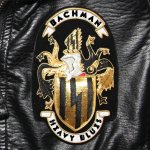
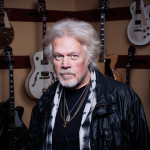
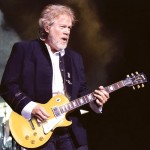
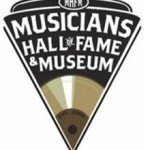

Wow, this is all great. if you are the Fred Turner I knew in late 50’s early 60’s, graduating from General Wolfe, I habpve picure of You &Cathy Fabrow, me (Pat Stephen & Allan Slack, Gr. 9 Grad. Hope you are he. I’m impressed. Pat West (Stephen)
God bless Randy Bachman and Fred Turner. I recently watched “Bachman & Turner” on AXSTV and I was and continue to be blown away by Randy’s Gibson Les Paul Guitar Tone. I know Randy was playing a “real deal” ’59 ‘Burst but after the guitars output jack I have no idea what his guitar ran through? I know Randy had a Wah Wah Pedal and it appeared that he was using Fender DeVille Amplifiers. I don’t know if Randy was using the 2X12″ or the 4X10″ version? Perhaps he used both? There were at least (2) of those Fender DeVilles and maybe (3) in the backline. Does anyone know what Randy has on his pedalboard? Does anyone know what brand and model amplifier/amplifiers Randy uses? Thank you.